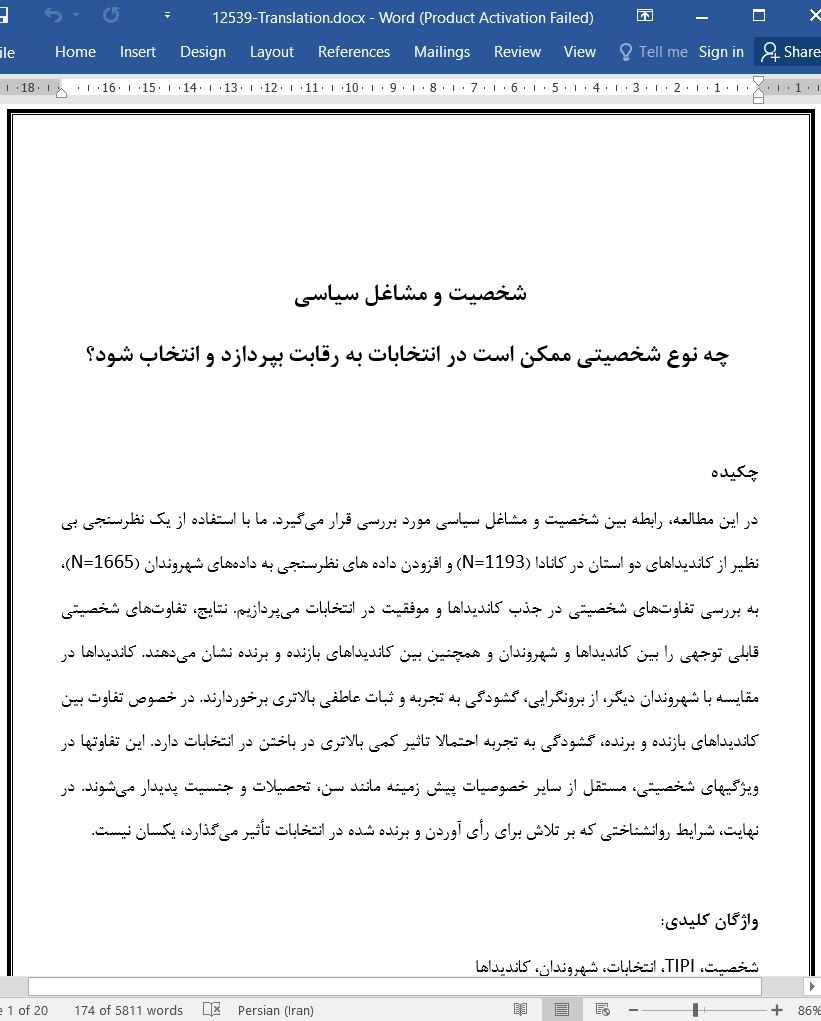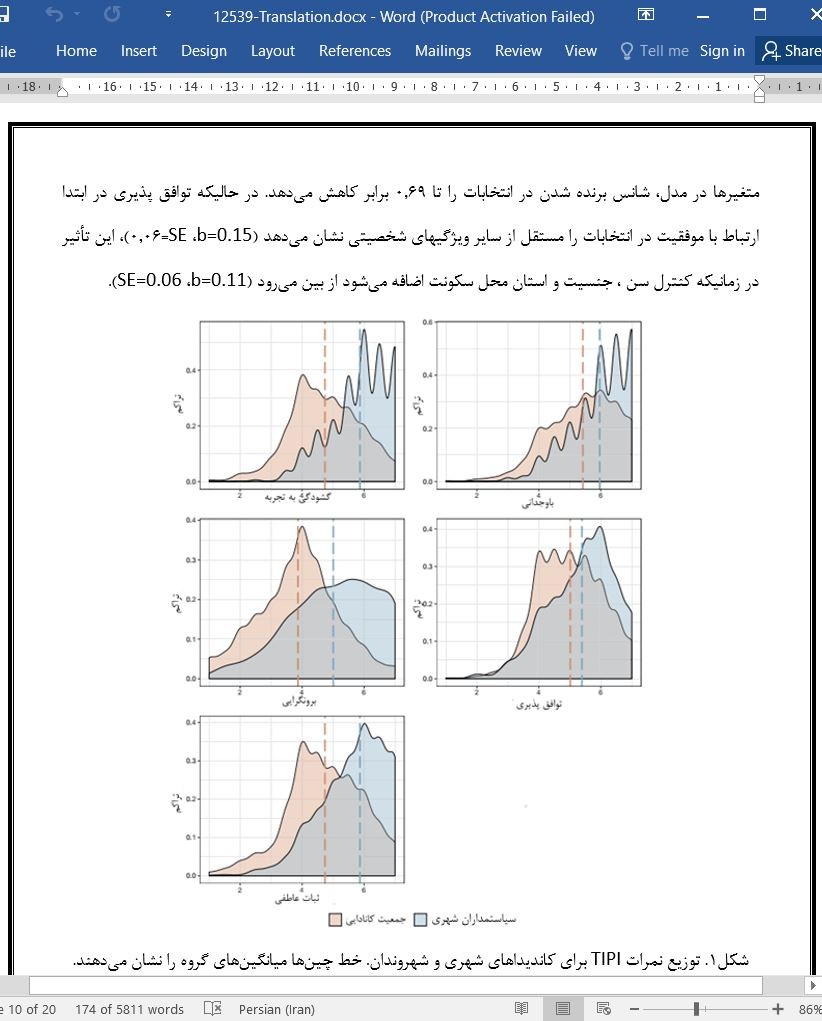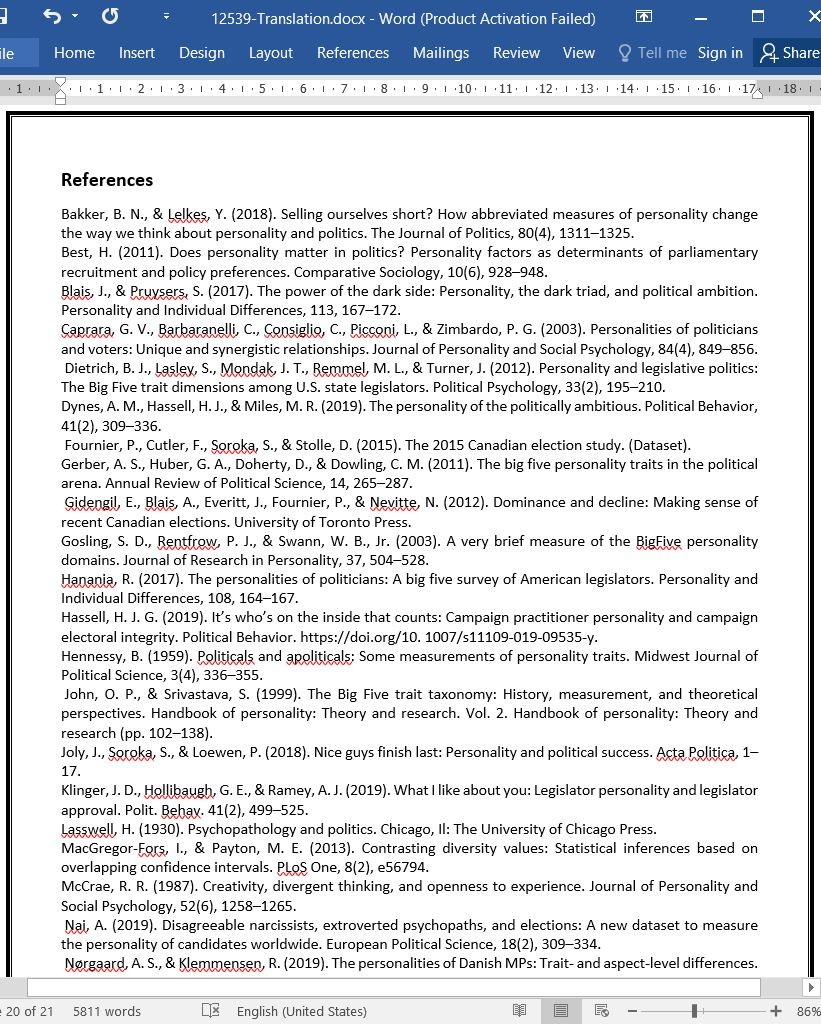
دانلود مقاله شخصیت و مشاغل سیاسی: چه نوع شخصیتی ممکن است در انتخابات به رقابت بپردازد و انتخاب شود؟
چکیده
در این مطالعه، رابطه بین شخصیت و مشاغل سیاسی مورد بررسی قرار میگیرد. ما با استفاده از یک نظرسنجی بی نظیر از کاندیداهای دو استان در کانادا (N=1193) و افزودن داده های نظرسنجی به دادههای شهروندان (N=1665)، به بررسی تفاوتهای شخصیتی در جذب کاندیداها و موفقیت در انتخابات میپردازیم. نتایج، تفاوتهای شخصیتی قابلی توجهی را بین کاندیداها و شهروندان و همچنین بین کاندیداهای بازنده و برنده نشان میدهند. کاندیداها در مقایسه با شهروندان دیگر، از برونگرایی، گشودگی به تجربه و ثبات عاطفی بالاتری برخوردارند. در خصوص تفاوت بین کاندیداهای بازنده و برنده، گشودگی به تجربه احتمالا تاثیر کمی بالاتری در باختن در انتخابات دارد. این تفاوتها در ویژگیهای شخصیتی، مستقل از سایر خصوصیات پیش زمینه مانند سن، تحصیلات و جنسیت پدیدار میشوند. در نهایت، شرایط روانشناختی که بر تلاش برای رأی آوردن و برنده شده در انتخابات تأثیر میگذارد، یکسان نیست.
1. مقدمه
ویژگیهای شخصیتی با تنوع قابل توجهی در نگرشها و رفتارهای سیاسی همراه هستند (Gerber، Huber، Doherty & Dowling، 2011). یک بخش از این مقالات و تحقیقات که در سالهای اخیر توسعه یافته است به شخصیت نخبگان سیاسی مربوط می شود. تحقیق در مورد شخصیت رهبران سیاسی دارای سابقهای غنی است که از روش های بسیاری استفاده کرده و با رویکردهای روانکاوی و مطالعات موردی (برای مثال، Lasswell، 1930) آغاز شده و تا تکمیل پرسشنامهها توسط سیاستمداران ادامه پیدا کرده است (برای مثال، Dietrich، Lasley، Mondak، Remmel، & Turner، 2012؛ Joly، Soroka & Loewen، 2018).
Hennessy (1959،ص 338) مینویسد “مفهوم اصلی شخصیت سیاسی این است که برخی از (خصوصیات) شخصیتی به نوعی رابطه قابل توجهی با فعالیت سیاسی دارند- یعنی اینکه برخی افراد ذاتاً سیاستمدار هستند اما برخی دیگر نه". آیا چنین است که "انواع خاصی"از افراد احتمالاً بیشتر از افراد دیگر برای رقابت در انتخابات تلاش میکنند؟ در حالیکه تحقیقات زیادی به بررسی تفاوتهای شخصیتی بین نخبگان سیاسی و شهروندان پرداختهاند (برای مثال، Caprara، Barbaranelli، Consiglio، Picconi، & Zimbardo، 2003؛ Nørgaard & Klemmensen، 2019)، تا جاییکه می دانیم هیچ مطالعهای در این خصوص اقدامی نکرده و این تفاوتهای بین برندگان و بازندگان انتخابات را بررسی نکرده است (بلکه همچنین Joly و همکاران، 2018 را ببینید که تعداد آراء ترجیحی دریافتی را مورد تجزیه و تحلیل قرار دادند).
5. نتیجه گیری ها
ما نتایج حاصل از نظرسنجیهای بزرگ در مورد کاندیداهای انتخابات شهری و شهروندان بزرگسال در دو استان کانادا را گزارش میکنیم. این یافتهها همانند مطالعات دیگر در خصوص شخصیت و جاه طلبی سیاسی، نشان میدهند که ویژگیهای شخصیتی جدا از سایر خصوصیات پس زمینه روانی و اجتماعی، بطور قابل اطمینانی با رقابت در انتخابات مرتبط هستند. در مقایسه با شهروندان، کاندیداهای محلی سطح بالاتری از گشودگی به تجربه، برونگرایی و ثبات عاطفی را گزارش کردند. این مطالعه با بررسی تأثیر شخصیت بر جذب کاندیداها و موفقیت در انتخابات، درک ما را نسبت به نقش شخصیت در انتخابات افزیش میدهد. ما می دانیم که کاندیداها به دلیل اینکه فراخ اندیشی نسبتاً بالاتری دارند، مجازات انتخاباتی کمتری را متحمل میشوند. بنابراین، شخصیت کاندیداها میتواند نتایج انتخابات، به ویژه انتخابات نزدیک را تحت تأثیر قرار دهد. در نهایت، یافتههای ما نشان میدهند که زمینه روانشناختی که به متمایز کردن کاندیداها از سایر شهروندان کمک میکند، لزوماً شبیه به آن دسته از زمینه های روانشناختی که به برنده شدن آنها در انتخابات کمک میکنند نیستند.
Abstract
This study investigates the relationship between personality and political careers. Drawing on a unique survey of municipal candidates from two Canadian provinces (N = 1193) and supplemented with survey data from citizens (N = 1665), we test for personality differences in candidate recruitment and electoral success. Results reveal significant personality differences between candidates and citizens, as well as between winning and losing candidates. Compared to other citizens, candidates are higher in extraversion, openness to experience, and emotional stability. As for the difference between electoral winners and losers, openness to experience is associated with a slightly higher likelihood of losing an election. These differences in personality traits emerge independent of other background characteristics such as age, education, and gender. Ultimately, the psychological dispositions that influence running for office and winning an election are not the same.
1. Introduction
Personality traits are associated with significant variation in political attitudes and behaviors (see Gerber, Huber, Doherty, & Dowling, 2011). One strand of this literature that has grown in recent years is the personality of political elites. Research on the personalities of political leaders has a rich history drawing from a multitude of methodologies, beginning with psychoanalytic approaches and case studies (e.g., Lasswell, 1930) to questionnaires completed by politicians (e.g., Dietrich, Lasley, Mondak, Remmel, & Turner, 2012; Joly, Soroka, & Loewen, 2018).
“The core concept” of the political personality, writes Hennessy (1959, p. 338), “is that certain personality [traits] are in some sense significantly related to political activism – that some people are ‘natural’ politicians while others are not.” Is it the case that ‘certain types’ of people are more likely than others to run for office? While there is a growing scholarship that explores personality differences between political elites and citizens (e.g., Caprara, Barbaranelli, Consiglio, Picconi, & Zimbardo, 2003; Nørgaard & Klemmensen, 2019), to our knowledge no study has taken the natural step further and examined these differences between electoral winners and losers (but see Joly et al., 2018, who analyze the number of preferential votes received). Among those who stand for election, to what extent are psychological predispositions associated with winning or losing the election? We build on an emerging literature around personality and running for office by exploring variation in electoral success with data from a large survey of municipal candidates from two Canadian provinces, coupled with data from a large survey of citizens.
5. Conclusions
We report results from large surveys of municipal election candidates and adult citizens in two Canadian provinces. In line with other studies on personality and political ambition, the findings show that personality traits are reliably associated with running for election, independent of other psychological and social background characteristics. Compared to citizens, local candidates self-reported higher levels of openness to experience, extraversion, and emotional stability. This study advances our understanding of the role of personality in elections by exploring the influence of personality on candidate recruitment and electoral success. We find that candidates receive a slight electoral penalty for their relatively higher open-mindedness. Thus, candidates' personalities could substantively influence the results, especially in close elections. Ultimately, our findings demonstrate that the psychological predispositions that help distinguish candidates from other citizens are not necessarily the same as those that may help candidates get elected.
چکیده
1. مقدمه
1.1. شخصیت و جاه طلبی سیاسی
1.2. شخصیت و موفقیت در انتخابات
1.3 ارزیابی شخصیت در نظرسنجی شهروندان و نخبگان
2 روش
2.1 شرکت کنندگان
2.1.1 مطالعۀ انتخابات کانادا
2.1.2 نظرسنجی کاندیداها
2.2 موضوعات و روند کار
2.2.1 پرسشنامه شخصیت 10 آیتمی
2.2.2 مسیرهای شغلی سیاسی
3 نتایج
3.1 ویژگیهای شخصیتی در بین کاندیداها و شهروندان
3.2 شخصیت و موفقیت در انتخابات
4 بحث
4.1 محدودیتها و مسیرهای آینده
5. نتیجه گیری
منابع
ABSTRACT
1. Introduction
1.1. Personality and political ambition
1.2. Personality and electoral success
2. Method
2.1. Participants
2.1.1. The Canadian Election Study
2.1.2. The candidate survey
2.2. Materials and procedures
2.2.1. The ten-item personality inventory
2.2.2. Political career paths
3. Results
3.1. Personality traits among candidates and citizens
3.2. Personality and electoral success
4. Discussion
4.1. Limitations and future directions
5. Conclusions
References
- اصل مقاله انگلیسی با فرمت ورد (word) با قابلیت ویرایش
- ترجمه فارسی مقاله با فرمت ورد (word) با قابلیت ویرایش، بدون آرم سایت ای ترجمه
- ترجمه فارسی مقاله با فرمت pdf، بدون آرم سایت ای ترجمه



